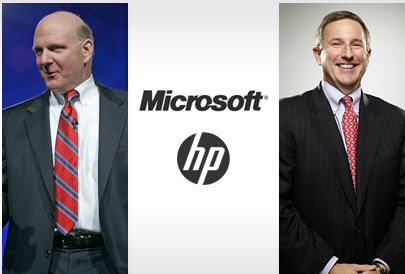Tag team skirmish: HP, Microsoft target Oracle, Sun

Microsoft and HP rolled out an extensive partnership that revolves around $250 million over three years to develop prepackaged software and hardware packages for the enterprise. There's a compelling case to be made that Microsoft and HP are targeting Oracle's hardware foray once its acquisition of Sun Microsystems closes.

Given that timing why wouldn't Microsoft-HP do a pre-emptive strike? Under a wide-ranging agreement---detailed by Mary Jo Foley on Wednesday---HP and Microsoft outlined the following:
- HP servers will become preconfigured with Microsoft's SQL Server or Exchange immediately;
- The companies will develop a preconfigured data warehousing play;
- Bundles for virtualized environments;
- Interoperability improvements with Microsoft's Hyper V, Azure and HP hardware;
- A dedicated sales force for these tag-team efforts;
- And a $250 million investment in the effort.
One obvious target here for Microsoft and HP is VMware. However, VMware is likely to be just collateral damage as the Microsoft-HP target a much bigger fish: Oracle and Larry Ellison's big hardware dreams.
Oracle and HP were partners on the first Exadata machine, which by most accounts is a hit with customers. The second Exadata machine is an Oracle-Sun creation. Obviously, HP sees the market for preconfigured hardware appliances. The problem: Oracle ran off and bought Sun, an HP rival. Enter the Microsoft-HP pact.
Cowen & Co. analyst Peter Goldmacher makes the case in a research note:
We believe that this program expansion was motivated at least in part by the Oracle/Sun merger. We believe that the merger influenced the scope and speed with which HP and Microsoft are co-developing these solutions and while we are not significantly concerned about a material market share impact, we believe the HP/Microsoft partnership could have an impact on Oracle/Sun pricing in the database and data warehousing businesses.
Goldmacher acknowledges that SQL Server and Oracle's database play in two different markets, but all HP has to do is to offer an alternative to ding Oracle/Sun's pricing power.
Meanwhile, the HP, Azure, Hyper-V connection is aimed squarely at Oracle's software and hardware stack. Oracle's stack will be Linux/Solaris/Oracle/virtualization and Sun's hardware.
We believe that this announcement affirms our belief that the Oracle/Sun merger has alienated HP, which has been both an important partner and customer for Oracle. We continue to believe that ongoing M&A in the Enterprise will increase pricing pressure as the larger players continue to aggressively go after market and wallet share in a low-growth sector.
As this tag-team match gets underway, HP and Microsoft have a little runway to get going. William Blair analyst Laura Lederman recently met with Oracle management and notes that the top priority after the Sun deal closes is to stabilize the base. Oracle is planning a Sun customer powwow and stop the bleeding in the hardware vendor's core businesses.
Lederman writes:
Oracle believes that after it announced the Sun deal, customers delayed purchases. Management believes that several factors have stabilized or improved sentiment in the Sun base. First, Oracle's contacting Sun customers helped to calm users. The change in the stance of the EU has also allayed fear over Sun's viability. Management also wonders if it agreed to buy Sun at the bottom of the market and now the deal should close when tech spending is getting better—it thinks that Sun’s results have bottomed.
In a nutshell, Lederman says that Oracle management will move to turn around Sun's core businesses. Once that happens, Oracle and Sun will focus on integrating technology stacks and launching new products.
That process may give Microsoft and HP enough time to strike a few body blows---along with IBM, which has actively targeted Sun throughout the Oracle merger saga.
Related: Oracle tries to stop Sun's bleeding: Is it too late?
Ellison wants to model new Oracle after T.J. Watson Jr.'s IBM